人教版七年级下册英语第四单元课件.ppt
合集下载
最新人教版七年级英语下册 全册PPT课件(443张)

Yes, I can./ No, I can’t.
2a Listen to these two conversations and
circle the clubs you hear.
a. English club b. art club c. music club d. chess club e. swimming club
Name can do S1 swim S2 S3
club swimming club
Listen to the conversation in 2d. Then answer the questions below.
1. Can Bob play soccer? _Y_e_s_,_h_e_c_a_n_.________
问答做某事的时间。
Read the following sentences. What time do you usually get up? I usually get up at six thirty. What time do they get dressed? They always get dressed at seven twenty.
2. Who wants to join two clubs? _J_a_n_e_._____________
Read the conversation in 2d. Fill in the chart.
Name what can does
clubs
Bob play soccer a sports club
Mary likes … She can … She wants to …
Talk about what clubs you want to join in a group.
2a Listen to these two conversations and
circle the clubs you hear.
a. English club b. art club c. music club d. chess club e. swimming club
Name can do S1 swim S2 S3
club swimming club
Listen to the conversation in 2d. Then answer the questions below.
1. Can Bob play soccer? _Y_e_s_,_h_e_c_a_n_.________
问答做某事的时间。
Read the following sentences. What time do you usually get up? I usually get up at six thirty. What time do they get dressed? They always get dressed at seven twenty.
2. Who wants to join two clubs? _J_a_n_e_._____________
Read the conversation in 2d. Fill in the chart.
Name what can does
clubs
Bob play soccer a sports club
Mary likes … She can … She wants to …
Talk about what clubs you want to join in a group.
Unit4SectionA1a1c课件人教版英语七年级下册

We can’t eat in the classroom. Don’t eat in the classroom.
个人抢答 +2分
We can’t run in the hallways. Don’t run in the hallways.
个人抢答 +2分
We can’t arrive\be late for class.
2. What about Amy? Is it OK to eat in the classroom? She’s eating in the classroom. It’s not OK.
3. What rule is Mike breaking?
He’s listening to music in class.
Don’t arrive\be late for class.
个人抢答 +2分
We can’t fight. Don’t fight .
She is eating an
Dave and Tom
apple .
They’re fighting .
What are thSeelyinadoing now (他
Can we fight at school? No, we can’t.
We can’t fight. Don’t fight .
个人抢答 +2分
We can’t listen to music in class. Don’t listen to music in class.
个人抢答 +2分
*图书馆规则* Don’t talk .
Don’t listen to music
Don’t eat or drink
个人抢答 +2分
We can’t run in the hallways. Don’t run in the hallways.
个人抢答 +2分
We can’t arrive\be late for class.
2. What about Amy? Is it OK to eat in the classroom? She’s eating in the classroom. It’s not OK.
3. What rule is Mike breaking?
He’s listening to music in class.
Don’t arrive\be late for class.
个人抢答 +2分
We can’t fight. Don’t fight .
She is eating an
Dave and Tom
apple .
They’re fighting .
What are thSeelyinadoing now (他
Can we fight at school? No, we can’t.
We can’t fight. Don’t fight .
个人抢答 +2分
We can’t listen to music in class. Don’t listen to music in class.
个人抢答 +2分
*图书馆规则* Don’t talk .
Don’t listen to music
Don’t eat or drink
2019人教版七年级英语下册Unit4_Don't_eat_in_class课件PPT(年春)教育物理

Don’t talk in class.
Don’t talk with each other in class. Stop talking in class.
Don’t play cards in school.
Don’t smoke .It’s bad for your health.
Don’t sleep in class.
Don’t fight. We can’t fight with others.
Grammar
1. 祈使句是表示请求、命令、叮嘱、号召、 劝告等的句子; 通常省略主语you; 句中谓语 动词用动词原形; 句尾一般用降调; 祈使句的
开头是动词原形。
祈使句有肯定和否定两种: e.g. Look out! 小心!
Don’t wear hats in class. Don’t dance in the classroom.
Wear a uniform.
Don’t listen to music in the classroom.
Listen to music in the music room.
Homework
Can we eat in class? No, we can’t.
Don’t eat in the classroom.
arrive late for class Can we arrive late for class? No, we can’t.
Don’t arrive late for class.
• Think about the family rules.
FAMILY RULES
Don’t talk loudly on the phone.
人教版英语七年级下册Unit4PPT课件
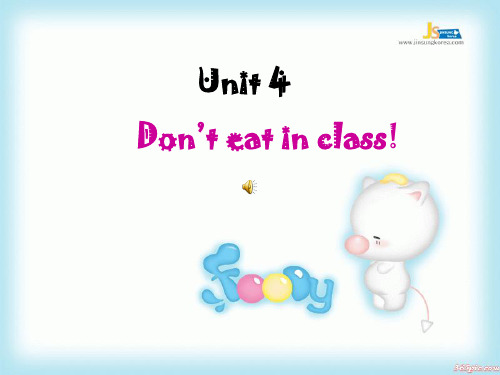
3:remember doing sth记得做过某事(做了)
如: I remember taking a desk to Tom
我记得已经拿给Tom了(已经做过了)
Do you remember __jion my party tomorrow,Alice
I can remember __your party last month.
3: learn from 向。。。学习
如:You should learn from Bob
你应该向Bob学习
4:learn about 学习什么 ,了解什么
如:I want to learn about history
2021/7/23
33
1. have fun玩的开心--have great fun玩的很开心 如:We always have great fun at parties 我们在聚会上总是玩的很开心
2.feel系动词----感受,觉得
feel sb do sth 感到某人做某事}这件事情已经发 生了
feel sth do sth感到某物做某事}这件事情已经发 生了
如:I felt a cat eat my food.(食物已经被吃了)
2021/7/23
25
1. feel sb/sth doing sth感到某人/某物正在做某 事(现在正在做的事情)
:
2:lucky(形容词)幸运的 You are lucky你是幸运的
3:unlucky(形容词)不幸运的
2021/7/23
30
1. keep (v) 使....保持
keep sb /sth +形容词/介词短语
表示:某人或某物保持某个状态
人教版新目标七年级英语下册第四单元课件PPT

点击这里输入您的标题
标题
单击此处添加段落文字内容
单击此处添加段落文字内容
单击此处添加段落文字内容
文本
文本
此处添加内容
单击添加段落文字单击添加段落文字
此处添加内容
单击添加段落文字单击添加段落文字
此处添加内容
单击添加段落文字单击添加段落文字
文本
点击这里输入您的标题
单击添加标题
单击添加标题
单击添加标题
单击这里输入内容,单击这里输入内容,单击这里输入内容单击这里输入内容,单击这里输入内容,单击这里输入内容单击这里输入内容,单击这里输入内容,单击这里输入内容
单击这里输入内容,单击这里输入内容,单击这里输入内容单击这里输入内容,单击这里输入内容,单击这里输入内容单击这里输入内容,单击这里输入内容,单击这里输入内容
点击这里输入您的课程标题
授课教师:Teacher /科目:语文/时间:20XX年X月
内容
1
2
3
4
5
这里输入您的标题三
这里输入您的标题四
这里输入您的标题五
这里输入您的标题一
这里输入您的标题二
章节
1
这里输入您的标题一
点击这里输入您的标题
点击这里输入您的标题
点击此处添加文字 点击此处添加文字
点击此处添加文字 点击此处添加文字
章节
5
这里输入您的标题五
点击这里输入您的标题
01
某某方面:这里输入你的文本内容这里输入你的文本内容这里输入你的文本内容这里输入你的文本内容你的文本内容
02
某某方面:这里输入你的文本内容这里输入你的文本内容这里输入你的文本内容这里输入你的文本内容你的文本内容
标题
单击此处添加段落文字内容
单击此处添加段落文字内容
单击此处添加段落文字内容
文本
文本
此处添加内容
单击添加段落文字单击添加段落文字
此处添加内容
单击添加段落文字单击添加段落文字
此处添加内容
单击添加段落文字单击添加段落文字
文本
点击这里输入您的标题
单击添加标题
单击添加标题
单击添加标题
单击这里输入内容,单击这里输入内容,单击这里输入内容单击这里输入内容,单击这里输入内容,单击这里输入内容单击这里输入内容,单击这里输入内容,单击这里输入内容
单击这里输入内容,单击这里输入内容,单击这里输入内容单击这里输入内容,单击这里输入内容,单击这里输入内容单击这里输入内容,单击这里输入内容,单击这里输入内容
点击这里输入您的课程标题
授课教师:Teacher /科目:语文/时间:20XX年X月
内容
1
2
3
4
5
这里输入您的标题三
这里输入您的标题四
这里输入您的标题五
这里输入您的标题一
这里输入您的标题二
章节
1
这里输入您的标题一
点击这里输入您的标题
点击这里输入您的标题
点击此处添加文字 点击此处添加文字
点击此处添加文字 点击此处添加文字
章节
5
这里输入您的标题五
点击这里输入您的标题
01
某某方面:这里输入你的文本内容这里输入你的文本内容这里输入你的文本内容这里输入你的文本内容你的文本内容
02
某某方面:这里输入你的文本内容这里输入你的文本内容这里输入你的文本内容这里输入你的文本内容你的文本内容
人教版七年级英语下册Unit4复习课件

—Do my homework, of course.
A. What
B. When
C. Where D. How
4. —
late for school again.
—Sorry, I won’t.
A. Not be B. Don’t be C. Not D. Don’t
5. Which of the following pictures means“Please be quiet”?
【用法辨析】listen与hear的区别
【活学活用】
Байду номын сангаас
①听! 你能听见汤姆正在唱歌吗?
! Can you
Tom singing now?
②不要在会上听收音机。
Don’t
the radio in the meeting.
答案: ①Listen; hear ②listen to
4. We can’t wear a hat in our school. 在我们学校里不允许戴帽子。 【自主领悟】wear“穿; 戴”, 表示状态。相当于be in。例如: He is wearing a black T-shirt. 他穿着一件黑色的T恤衫。
【归纳拓展】before的其他用法
【活学活用】
①She always says goodbye to her mother before
(go)to school.
②He always washes his feet
he goes to bed.
A. after
B. because
C. if
D. before
his workers and he is
also strict
人教版七年级英语unit4全单元ppt课件

2 6
1
5 3
4
12
Listening (P20 2b): Number the things in the picture.
(听力:将这些物品的序号(1-6)标在图上)
1 1
2
3
4
3
6
5
2
6
54
13
14
Exercise
Translate the following sentences into English. (翻译)
4
Task1:What can you see in my room?
5
Match the words with the pictures. 1.table__b____ 2.bed___e______ 3.bookcase__h___ 4.sofa___g____ 5.Chair__d_ 6.schoolbag__a__ 7.books___f _____ 8.keys____c______
5. Yes, it is.
Yes, they are.
6. No, she isn’t. No, they aren’t.
49
4. They is under the desk. A B C It is under the desk.
5. Where is the his book?
A
BC
Where is his book?
map,…
CDs, telephone, picture,
41
Write about the things in your room.
• The tape player is on the teacher’s desk and the teacher’s desk is in the front of the classroom. The clock is on the wall. Our chairs are under the desks.
1
5 3
4
12
Listening (P20 2b): Number the things in the picture.
(听力:将这些物品的序号(1-6)标在图上)
1 1
2
3
4
3
6
5
2
6
54
13
14
Exercise
Translate the following sentences into English. (翻译)
4
Task1:What can you see in my room?
5
Match the words with the pictures. 1.table__b____ 2.bed___e______ 3.bookcase__h___ 4.sofa___g____ 5.Chair__d_ 6.schoolbag__a__ 7.books___f _____ 8.keys____c______
5. Yes, it is.
Yes, they are.
6. No, she isn’t. No, they aren’t.
49
4. They is under the desk. A B C It is under the desk.
5. Where is the his book?
A
BC
Where is his book?
map,…
CDs, telephone, picture,
41
Write about the things in your room.
• The tape player is on the teacher’s desk and the teacher’s desk is in the front of the classroom. The clock is on the wall. Our chairs are under the desks.
新人教版新目标英语七年级下册Unit4全单元精品课件(共248页PPT)

1.组内争优! 2. 组间PK! 3.全班摘星 !
祈使句 1.祈使句是表示请求、命令、邀请、 劝告、号召等的句子。 2.特点:1)通常省略主语 you. 2)句中谓语动词用动词原形。 3)祈使句有肯定和否定两种:
否定
Don’t eat in class. Don’t play sports in the classroom. Don’t fight . Come in, please! 请进! Sit down, please. 请坐。
无规矩不成方圆。
Do you know the places that have rules? And what rules do you know?
family rules school rules class rules 家规
校规
班规
library rules
dining rules
图书馆规则
A too late, the host will be unhappy. If you _____ A. arrive B. get to C. arrive at Don’t arrive (not arrive) late for class. ___________
2. You must be on time. 你们必须守时。 1) must 作为情态动词,表示“必须”、 “务必”,有时还表示“一定”,起到加 强语气的作用。例如: You must come tomorrow. 你(们)明天必须要来。 在回答must引起的问句时,如果是否定的答 复,可用don’t have to或needn’t (不必) , 但不能用mustn’t (一定不, 必须不, 不允许, 不得) 。
说一说规则
What can you say to them?
祈使句 1.祈使句是表示请求、命令、邀请、 劝告、号召等的句子。 2.特点:1)通常省略主语 you. 2)句中谓语动词用动词原形。 3)祈使句有肯定和否定两种:
否定
Don’t eat in class. Don’t play sports in the classroom. Don’t fight . Come in, please! 请进! Sit down, please. 请坐。
无规矩不成方圆。
Do you know the places that have rules? And what rules do you know?
family rules school rules class rules 家规
校规
班规
library rules
dining rules
图书馆规则
A too late, the host will be unhappy. If you _____ A. arrive B. get to C. arrive at Don’t arrive (not arrive) late for class. ___________
2. You must be on time. 你们必须守时。 1) must 作为情态动词,表示“必须”、 “务必”,有时还表示“一定”,起到加 强语气的作用。例如: You must come tomorrow. 你(们)明天必须要来。 在回答must引起的问句时,如果是否定的答 复,可用don’t have to或needn’t (不必) , 但不能用mustn’t (一定不, 必须不, 不允许, 不得) 。
说一说规则
What can you say to them?
人教版英语七年级下册Unit 4 Section A ( 1a-2d)新版课件
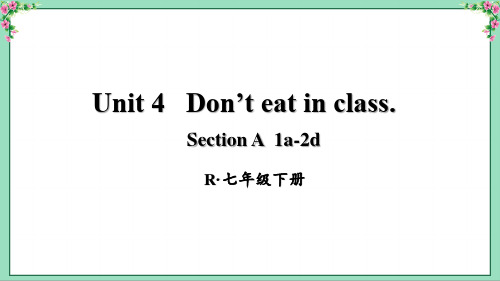
Mr. Smith: Hey, Mike, don’t listen to music
in class. Mike! 3 在课堂上听音乐 Boy: He can’t hear you, Mr. Smith.
1c Student A is a new student. Student B tells Student A about the rules above.
Peter __2___ Amy ___3__ Mike __4___
记下关键词
Listen and answer the questions.
1. What rule is Peter breaking? He’s running in the hallways.
2. What about Amy? Is it OK to eat in the classroom? She’s eating in the classroom. It’s not OK.
How can we become a good student?
What can we do at school? What can’t we do at school?
Let’s look and learn
be on time 准时
You can’t arrive late for class. Don’t __a_rr_i_v_e_l_a_te__f_o_r_c_la_s_s___. You __m_u_s_t_b_e__o_n_t_i_m_e________.
Sorry, Ms. Clark.
SCHOOL RULES
1. Don’t arrive late for class. You must be on time.
Unit 4 Section B-人教版七年级英语下册课件(共10张PPT)
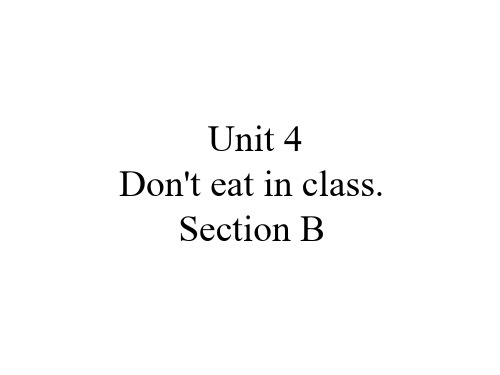
即学即练
( C )He often ________ volleyball after school.
A.practice play
B.practices play
C.practices playing D.practice to play
2.There are too many rules! 有太多的规矩了! rules是可数名词的复数形式,所以用too many修饰。
课堂同步
阅读课本第23页2b,回答下列问题。 1.Can Molly play basketball after school? ___N__o_,_s_h_e__c_an_'_t.________________________ 2.When does Molly play basketball? ___O_n__w_e_e_k_e_n_d_s_. ________________________ 3.What does Molly do before watching TV? ___S_h_e__m_u_s_t_r_ea_d__a_b_o_o_k_.__________________ 4.When does Molly go to bed? ___B__ef_o_r_e_1_0_:__0_0_._______________________ 5.Does Molly like the school and home rules? ___N__o_,__s_h_e _d_o_e_s_n_'t.______________________
I practice English every day. 我每天都练习英语。
I practice speaking English every day. 我每天都练习讲英语。 (2)practice作名词时,是不可数名词,意为“练习, 实践”。如:
人教版七年级英语下册Unit 4 Don’t eat in class. Section A 课件2
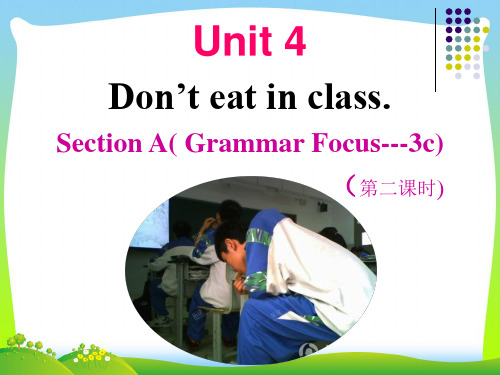
1. 肯定祈使句的常见句型结构: ① Do型:动词原形+宾语+其他. 如:
Open the door, please. ② Be型:Be+表语. 如:
Be a good boy! ③ Let型:Let+宾语+动词原形+其他.如:
Let me help you.
(或:Let’s+动词原形+其他.) 如: Let’s play tennis.
3. Listen to music? Q:_C__an__w_e_l_is_te_n_t_o_m_u_s_i_c _in_t_h_e_h_a_ll_w_a_ys_?___
(we/ can/ in the hallways)? A: N__o,_w_e_c_a_n_’t_. _______
4. Wear a hat? Q: _C_a_n_w_e__w_e_a_r a_h_a_t_in_t_h_e_c_la_s_s_ro_o_m_?_____
17、儿童是中心,教育的措施便围绕他们而组织起来。2021/7/202021/7/202021/7/202021/7/20
2、Our destiny offers not only the cup of despair, but the chalice of opportunity. (Richard Nixon, American President )命运给予我们的不是失望之酒,而是机会之杯。二〇二一年六月十七日2021年6月17日星期四 3、Patience is bitter, but its fruit is sweet. (Jean Jacques Rousseau , French thinker)忍耐是痛苦的,但它的果实是甜蜜的。10:516.17.202110:516.17.202110:5110:51:196.17.202110:516.17.2021 4、All that you do, do with your might; things done by halves are never done right. ----R.H. Stoddard, American poet做一切事都应尽力而为,半途而废永远不行6.17.20216.17.202110:5110:5110:51:1910:51:19 5、You have to believe in yourself. That's the secret of success. ----Charles Chaplin人必须相信自己,这是成功的秘诀。-Thursday, June 17, 2021June 21Thursday, June 17, 20216/17/2021
人教版七年级英语下册教学课件《Unit 4 Section A 1a-1c》
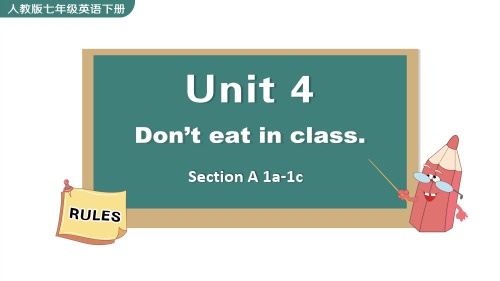
违反规章
school rules 校纪 = the rules of the school class rules 班规 = the rules of the class ※ rule还可以用作动词,意为“统治,支配”。 e.g. The king ruled the country 500 years ago.
2. It’s very hot outside. You __c_a_n__ wear a hat. 3. We _c_a_n_’_t_ eat in the classroom, because it’s
impolite to teachers. 4. I _c_a_n_’_t_ go to bed after 11:00 on school night. 5. The students __c_a_n__ read books and magazines
I never heard such an interesting story. 我从来没听过这么有趣的一个故事。
2) listen“听” 侧重于“听”这一动作。例如: Listen to me carefully. 认真听我说。
Children like to listen to music. 孩子们喜欢听音乐。 3) sound“听起来”,它是系动词,后面接形容词等。 例如: That sounds great. 那听起来真不错。 It sounds like fun. 听起来挺有趣。
2. When do you usually arrive _a_t__ the bus station?
3. Jenny’s uncle usually arrives _in__ Shanghai in the evening.
人教版七年级英语下册Unit 4 Section A 第一课时课件

Listen. What rules are these students breaking? Write the numbers after the names.
Name
Peter
Amy
Mike
Rule
2
3
4
1b
1. Don't arrive late for class. You must be on time. 2. Don't run in the hallways. 3. Don't eat in the classroom. You must eat in the dining hall. 4. Don't listen to music in class. 5. Don't fight.
Role-play the conversation.
John: Hi, my name’s John. It’s my first day at school. Alice: Hi, John. I’m Alice. This is a great school, but there are a lot of rules. John: Really? What are some of the rules? Alice: Well, don’t be late for class. This is very important.
1c
Student A is a new student. Student B tells Student A about the rules above.
A: What are the rules? B: Well, we can’t arrive late for class. We must be on time.
Name
Peter
Amy
Mike
Rule
2
3
4
1b
1. Don't arrive late for class. You must be on time. 2. Don't run in the hallways. 3. Don't eat in the classroom. You must eat in the dining hall. 4. Don't listen to music in class. 5. Don't fight.
Role-play the conversation.
John: Hi, my name’s John. It’s my first day at school. Alice: Hi, John. I’m Alice. This is a great school, but there are a lot of rules. John: Really? What are some of the rules? Alice: Well, don’t be late for class. This is very important.
1c
Student A is a new student. Student B tells Student A about the rules above.
A: What are the rules? B: Well, we can’t arrive late for class. We must be on time.
人教版七年级英语下册《Unit4 Don't eat in class》课件

spit
School Rules
1. Don’t arrive late for class. 2. Don’t run in the hallways or the classrooms. 3. Don’t eat in the classroom. 4. Don’t listen to music in the
What are the rules at school?
Don’t listen to music Don’t smoke. Don't spit everywhere Don’t fight Don’t draw
in the classrooms.
on the wall
Don’t run in the hallways or the classrooms. Don’t talk in class
classrooms or the hallways. 5. Don’t fight. 6. Don’t play computer games. 7. Don’t talk in class. 8. Don’t draw on the wall. 9. Don’t smoke. 10. Don’t spit everywhere.
15、一年之计,莫如树谷;十年之计,莫如树木;终身之计,莫如树人。2021年7月2021/7/202021/7/202021/7/207/20/2021
16、提出一个问题往往比解决一个更重要。因为解决问题也许仅是一个数学上或实验上的技能而已,而提出新的问题,却需要有创造性的想像力,而且标志着科学的真正进步。2021/7/202021/7/20July 20, 2021
10、阅读一切好书如同和过去最杰出的人谈话。2021/7/202021/7/202021/7/207/20/2021 8:04:50 PM
人教版七年级英语下册Unit 4 Don't eat in class Section A 课件

5. Jack, ________ to be here at 8 o'clock
A. is sure
B. sure
C. be sure
D. are sure
6. ____ go to the store. Let sb. do sth.
A. Let's B. Don't let they C. Let we D. No let me
感叹句:Nice to meet you!
祈使句
祈使句一般用来表示请求、命令、劝说、号召、警告等。 肯定式:(You) + v. +... 否定式:(You) + don't + v. + ...
在祈使句中, 通常省略第二人称主语you。 肯定式以动词原形开头,否定式一般在动词原形前加don't。
Don't _a_r_r_iv_e__/ _b_e_l_a_te__f_o_r (迟到) class.
We can _a_r_ri_v_e_h_o_m__e_ (到家) at 8:00 p.m..
2. They always fight f_o_r_ (介词) money.
fight with sb. 和... 打架;和...共同战斗
2. 不要D在oin晚g s饭po后rts吃is g冰oo激d f凌or。our health.
DonS'hteeias tgoicoed-wcritehacmhildarfetne.r dinner.
3. 对朋ds.
4. 让我帮助你。
Let's me (x)
1c Student A is a new student. Student B tells Student A
七年级下册第四单元英语人教版 PPT

1. listen to music in the classroom or can can’t
hallways
2. listen to music in music room can can’t
3. listen to music outside
can can’t
4. eat in the classroom
大家应该也有点累了,稍作休息
大家有疑问的,可以询问和music in the classroom、
Don’t arrive late for school、
Don’t eat in the classroom、 You must eat in the dining hall、
homme、ust 2、 We ____ be good with our parents、
将下列句子译成英语。
1. 不要在上课时听音乐。 D__o_n_’t__li_st_e_n__to__m_u_s_i_c_i_n_c_l_a_s_s、__
2、 我们必须准时。 W__e__m__u_st__b_e_o_n__ti_m__e、__________
_W__e_m__u_s_t_b_e_o_n__t_im__e_f_o_r_c_l_a_s_s、______
5、 我们可以在教室里吃东西吗?
_C_a_n__w__e_e_a_t_in__t_h_e_c_l_a_ss_r_o_o_m__?____ 6、 不能。但我们可以在餐厅里吃东西。
_N_o_,_w__e_c_a_n_’_t_, _b_u_t_w_e__c_a_n_e_a_t_i_n__th_e___ _d_i_n_in_g__h_a_l_l、______________________ 7、 我们可以在上课得时候带帽子吗?
人教七英下Unit 4 Section A 第一课时课件

Summary Do… & Don’t…
• 1. 祈使句表示命令、叮嘱、请求、号召等。
• 2. 通常省略主语you。
• 3. 谓语动词用原形。
• 4. 肯定句为:Shut up! Sit down ,please. • 5. 否定句在句首加Don’t 或者 Never:
如:Don’t cry! Never give up!
Read and learn
Words and sentences
hallway
run in the hallways We can’t run in the hallways. Don’t run in the hallways.
fight We can’t fight.
Don’t fight!
2. _√__ listen to music in the
music room
can can’t
3. _√__ listen to music outside can can’t 4. _√__ eat in the classrooms can can’t
2b Listen again. Can Alan and Cindy do these activities? Circle can or can’t above.
We can’t listen to music in the hallways, but we can listen to it outside.
Can we listen tomusic,Cindy?
2d Role-play the conversation.
John: Hi, my name’s John. It’s my first day at school.
相关主题
- 1、下载文档前请自行甄别文档内容的完整性,平台不提供额外的编辑、内容补充、找答案等附加服务。
- 2、"仅部分预览"的文档,不可在线预览部分如存在完整性等问题,可反馈申请退款(可完整预览的文档不适用该条件!)。
- 3、如文档侵犯您的权益,请联系客服反馈,我们会尽快为您处理(人工客服工作时间:9:00-18:30)。
fight with sb. 同某人打架 fight the fire 救火
Explanation
fight 是不及物动词,其后加上with才能接 宾语。fight with sb. 意为“与某人打架”。 如: Don’t fight with your sister again.
不要再和你妹妹打架了。 They are fighting with the enemies bravely. 他们正在勇敢地同敌人战斗。
Don’t eat in the classroom.
School Rules
Don’t listen to music in the classrooms or the hallways.
School Rules Don’t fight.
School Rules
Don’t talk in class. Don’t talk with each other in class.
• 铺床
make one’s bed
• 与某人打架 fight with sb
• 戴帽子
wear a hat/wear hats
School Rr class.
School Rules
Don’t run in the hallways.
School Rules
School Rules
Don’t sleep in class.
School Rules
Don’t use mobile phone in class.
School Rules
Don’t smoke. (No smoking)
We can’t rule the country without rules.
2.祈使句的否定形式是在整个结构之前加 don’t或never。如: Don’t be nervous!你不要紧张!
Practice 将下列祈使句改成否定形式。
肯定祈使句
否定祈使句
1. Sit down.
Don’t sit down.
2. Come in.
Don’t come in.
3. Eat at home.
没有规章制度就不能治理好国家.
follow the rules
遵守规则
keep rules
family rules 家规
break rules 违反规则 library rules
school rules 校规
图书馆规则
dining rules 就餐规则
class rules 班规
Language goals
Let’s go! Let us go home! Let him be here by 10 o’clock.
拓展
祈使句
二、祈使句的强调形式及否定形式 1.祈使句的强调形式是在整个结构之前加
do。如:
Do give my regards to your parents! 务必/一定代我向你父母问好!
• He gets to school on time everyday
• 她及时赶到了医院。
• She reach the hospital in time. • be sitnrsiicdte with里s面b.的;在里部的
• 他爸爸对他很严格。
• His father is strict with him.
拓展
情态动词can的用法
用于疑问句中用来提出要求。例如: Can you...?“请你……好吗?”表示说话 人的请求。 Can I...?“我可以……吗?”用来征求对 方是否允许自己做某事。如在句末加上 please一词就显得更有礼貌了。例如:
1.第二人称祈使句通常用来向听话者发出命 令,提出要求或建议。这种祈使句的主语
you通常不表示出来,而是以动词原形开 头。如: Stand up! Don’t worry about!
拓展
祈使句
2.第一、三人称祈使句是以第一人称和第 三人称代词或者名词等作为祈使的对 象,这类祈使句通常以let为引导词表建 议。如:
重点短语
• ……迟到 arrive(be) late for ……
• 在走廊/餐厅 in the hallway/ dining hall
• 在教室/音乐教室 in the classroom/ music room
• 听(音乐) listen to (the music)
• 外出
go out
• 清洗餐具 do the dishes
1. 表示能力(如体力和脑力方面),意为 “能;会”等。例如: Can you speak English? 你会讲英语吗?
2. 表示请求或允许,多用在口语中,意为“可以; 能”等。例如: Can I help you? 我能帮助你吗? 用于否定句表示不允许。例如: You can’t play basketball. 你不能玩篮球。
Don’t eat at home.
4. Listen to music outside.
Don’t listen to music outside. 5. Do your homework at school.
.Don’t do your homework at school.
拓展
情态动词can的用法
Unit 4
Don’t eat in class.
New words
hallway 走廊;过道
New words
classroom 教室
New words
rule
规则
New words
dinning 饭厅;餐厅
New words
fight
打架;争吵
Don’t fight . 不要打架. fight 战斗, 斗争, 作战
Notes : 1 arrive in / at + 地点
get to +地点 reach +地点 (到达某地方 ) 2 class 班 ,课 in class 在课堂上 have classes 上课 be late for class 上课迟到
• on time 准时
in time 及时
• 他每天准时到校。
talk about rules
谈论规则
break the rules
违反规则
break the school rules 违反校规
break the class rules 违反班规
拓展
祈使句
一、祈使句的分类
祈使句表请求、命令、叮嘱、邀请、劝告 等。祈使句分为第二人称祈使句及第—、 三人称祈使句两大类。
Explanation
fight 是不及物动词,其后加上with才能接 宾语。fight with sb. 意为“与某人打架”。 如: Don’t fight with your sister again.
不要再和你妹妹打架了。 They are fighting with the enemies bravely. 他们正在勇敢地同敌人战斗。
Don’t eat in the classroom.
School Rules
Don’t listen to music in the classrooms or the hallways.
School Rules Don’t fight.
School Rules
Don’t talk in class. Don’t talk with each other in class.
• 铺床
make one’s bed
• 与某人打架 fight with sb
• 戴帽子
wear a hat/wear hats
School Rr class.
School Rules
Don’t run in the hallways.
School Rules
School Rules
Don’t sleep in class.
School Rules
Don’t use mobile phone in class.
School Rules
Don’t smoke. (No smoking)
We can’t rule the country without rules.
2.祈使句的否定形式是在整个结构之前加 don’t或never。如: Don’t be nervous!你不要紧张!
Practice 将下列祈使句改成否定形式。
肯定祈使句
否定祈使句
1. Sit down.
Don’t sit down.
2. Come in.
Don’t come in.
3. Eat at home.
没有规章制度就不能治理好国家.
follow the rules
遵守规则
keep rules
family rules 家规
break rules 违反规则 library rules
school rules 校规
图书馆规则
dining rules 就餐规则
class rules 班规
Language goals
Let’s go! Let us go home! Let him be here by 10 o’clock.
拓展
祈使句
二、祈使句的强调形式及否定形式 1.祈使句的强调形式是在整个结构之前加
do。如:
Do give my regards to your parents! 务必/一定代我向你父母问好!
• He gets to school on time everyday
• 她及时赶到了医院。
• She reach the hospital in time. • be sitnrsiicdte with里s面b.的;在里部的
• 他爸爸对他很严格。
• His father is strict with him.
拓展
情态动词can的用法
用于疑问句中用来提出要求。例如: Can you...?“请你……好吗?”表示说话 人的请求。 Can I...?“我可以……吗?”用来征求对 方是否允许自己做某事。如在句末加上 please一词就显得更有礼貌了。例如:
1.第二人称祈使句通常用来向听话者发出命 令,提出要求或建议。这种祈使句的主语
you通常不表示出来,而是以动词原形开 头。如: Stand up! Don’t worry about!
拓展
祈使句
2.第一、三人称祈使句是以第一人称和第 三人称代词或者名词等作为祈使的对 象,这类祈使句通常以let为引导词表建 议。如:
重点短语
• ……迟到 arrive(be) late for ……
• 在走廊/餐厅 in the hallway/ dining hall
• 在教室/音乐教室 in the classroom/ music room
• 听(音乐) listen to (the music)
• 外出
go out
• 清洗餐具 do the dishes
1. 表示能力(如体力和脑力方面),意为 “能;会”等。例如: Can you speak English? 你会讲英语吗?
2. 表示请求或允许,多用在口语中,意为“可以; 能”等。例如: Can I help you? 我能帮助你吗? 用于否定句表示不允许。例如: You can’t play basketball. 你不能玩篮球。
Don’t eat at home.
4. Listen to music outside.
Don’t listen to music outside. 5. Do your homework at school.
.Don’t do your homework at school.
拓展
情态动词can的用法
Unit 4
Don’t eat in class.
New words
hallway 走廊;过道
New words
classroom 教室
New words
rule
规则
New words
dinning 饭厅;餐厅
New words
fight
打架;争吵
Don’t fight . 不要打架. fight 战斗, 斗争, 作战
Notes : 1 arrive in / at + 地点
get to +地点 reach +地点 (到达某地方 ) 2 class 班 ,课 in class 在课堂上 have classes 上课 be late for class 上课迟到
• on time 准时
in time 及时
• 他每天准时到校。
talk about rules
谈论规则
break the rules
违反规则
break the school rules 违反校规
break the class rules 违反班规
拓展
祈使句
一、祈使句的分类
祈使句表请求、命令、叮嘱、邀请、劝告 等。祈使句分为第二人称祈使句及第—、 三人称祈使句两大类。
